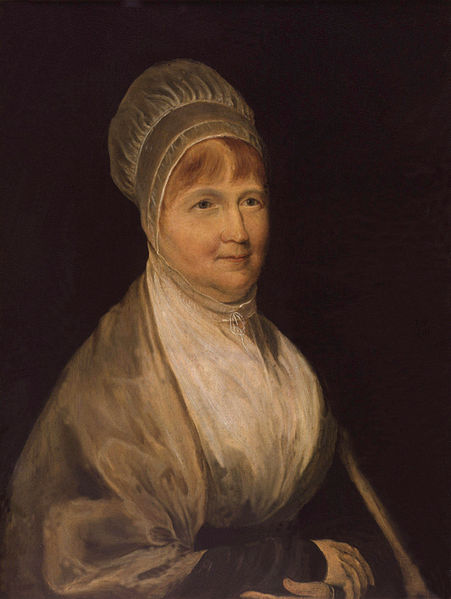Elizabeth Fry

Credit: after Charles Robert Leslie (died 1859)
Licence: PD -ART
Unknown date, after 1823 original
| Giver: | Individual |
|---|---|
| Receiver: | Individual or unstructured/informal group, Other |
| Gift: | Time |
| Approach: | Philanthropy |
| Issues: | 16. Peace, Justice and Strong Institutions |
| Included in: | Social Activism |
Elizabeth Fry (1780-1845) was an influential British prison reformer, social justice activist and Quaker (Society of Friends) minister. Throughout her life, her work was guided by the core Quaker belief in the basic equality, worthiness and divine inner light of every human being. Progressive for her day, Frye argued that prisoners could achieve moral improvement and eventually rejoin society through meaningful social engagement, spiritual enrichment, education and paid work. For her radical kindness and tireless advocacy, Fry became famous during her lifetime and is still remembered as the “Angel of Prisons.”
Elizabeth Gurney was born in 1780 in Norwich, England, to a prominent Quaker family. As a young woman she converted to Plain Quakerism, a tradition known for its rigorous asceticism, and devoted herself to serving those more materially and socially vulnerable than herself.
In 1800 Gurney married Joseph Fry, with whom she had eleven children. Beyond marriage and motherhood, she continued to pursue her religious and philanthropic calling, becoming a Quaker minister in 1811.
Fry visited Newgate Prison in London for the first time in 1813, intending to pray with the women prisoners. She was shocked by the crowded and unsanitary conditions under which the women and their children were confined, and the abuses they endured at the hands of male guards and prisoners. In the years that followed Fry campaigned for key institutional reforms, including separate facilities for male and female inmates and opportunities for prisoners to receive education, vocational training, paid work (often knitting and sewing) and religious instruction.
In 1817 Fry established the Association for the Improvement of Female Prisoners at Newgate, a volunteer committee of Quaker women who visited the prison daily to mentor the prisoners, approaching them in a spirit of mercy rather than judgment. Rather than imposing a code of conduct for the prisoners, she recommended rules (including prohibitions on drinking, gambling and fighting) and invited the women volunteers to vote on their adoption.
The prisoners willingly embraced Fry’s program, soon demonstrating their capacity to modify their behavior and learn new skills. Emboldened by her success, Fry traveled the country, visiting other prisons and making her case for reform. In 1821 the Newgate Association expanded to become the British Ladies Society for Promoting the Reformation of Female Prisoners. Two years later, Parliament passed the Gaols Act, adopting many of Fry’s reforms into law. Fry’s model of compassionate discipline subsequently influenced prison reforms across Europe and in the United States.
Fry died of a stroke in 1845. The legacy of her philanthropic activism continues to resonate and inspire social justice work in Europe and North America today.
Contributors: Maha Tazi, Erin Brown
| Source type | Full citation | Link (DOI or URL) |
|---|---|---|
| Website |
Barrett, Elizabeth. “Elizabeth Fry: The Angel of Prisons”. East End Women’s Museum, 2021. |
https://eastendwomensmuseum.org/blog/2021/8/3/vtydufduudc37pku1ahwb9c3ot24xe |
| Publication |
Britannica, T. Editors of Encyclopaedia. “Elizabeth Fry.” Encyclopedia Britannica, 2022. |
https://www.britannica.com/biography/Elizabeth-Fry. |
| Website |
“The History of Elizabeth Fry Charity: Supporting Women to Make Positive Changes in their Lives”, Elizabeth Fry Charity, 2022 Retrieved 5/11/2022 . |
https://www.elizabethfry.co.uk/History |
| Website |
Steyaert, Jan. “Elizabeth Fry: Angel of the prisons”. History of Social Work, 2010. |
https://historyofsocialwork.org/eng/details.php?cps=0&canon_id=149 |
| Website |
“Elizabeth Fry”, Quackers in the World. n.d. Retrieved 5/11/2022 |
https://www.quakersintheworld.org/quakers-in-action/13/Elizabeth-Fry |